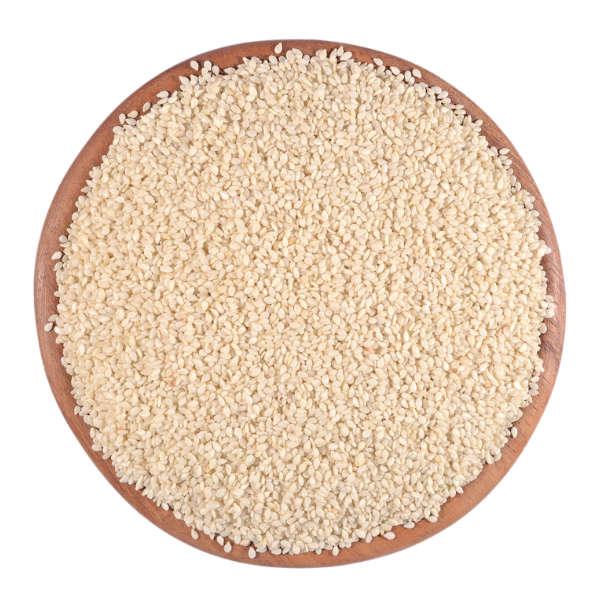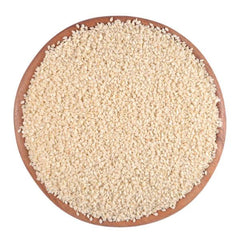



Description
xOur crunchy and delicious sesame seeds are raw, organic, and perfect for sprinkling on steamed vegetables, adding to cereals or yogurt, or including in your favorite baking recipes.
Sesame seeds are packed with protein, fiber, lignans, and essential vitamins and minerals. They also contain powerful antioxidants like sesamin and sesamolin, which help combat free radicals in the body, contributing to overall health and vitality.
Nutritional Information & Health Benefits
Sesame seeds are a nutrient-dense addition to your diet. Here's what makes them stand out:
| Nutrient | Amount per 2 Tbsp Serving | % Daily Value* |
|---|---|---|
| Calories | 104 | - |
| Carbohydrates | 2.1 g | 1% |
| Protein | 3.2 g | 6% |
| Fat | 9 g | 14% |
| Fiber | 1.7 g | 7% |
| Copper | 0.74 mg | 36.75% |
| Manganese | 0.45 mg | 22.25% |
| Tryptophan | 0.09 g | 18.75% |
| Calcium | 175 mg | 17.5% |
| Magnesium | 63 mg | 15.75% |
| Iron | 2.6 mg | 14.5% |
Percent Daily Values are based on a 2,000-calorie diet.
Sesame seeds are also rich in monounsaturated fats, phytosterols, and B-complex vitamins like niacin and folic acid.
Health Benefits
Sesame seeds provide numerous health benefits thanks to their impressive nutritional profile:
- Antioxidant Power: Sesamin and sesamolin, unique antioxidants found in sesame seeds, help combat free radicals and may protect against oxidative damage.
- Heart Health: High levels of phytosterols and oleic acid (monounsaturated fats) support healthy cholesterol levels and cardiovascular function.
- Bone Health: Rich in calcium, magnesium, and copper, sesame seeds help maintain strong bones.
- Energy Boost: Packed with protein and amino acids, sesame seeds provide lasting energy and help support muscle repair.
- Liver Protection: Sesamin has been shown to protect the liver from oxidative damage and improve its overall function.
- Blood Health: High levels of iron and folic acid promote healthy red blood cell production.
Interesting Facts About Sesame Seeds
- Sesame seeds have been used for medicinal purposes since 3000 B.C.
- They are considered a symbol of good luck in many African cultures.
- Sesame seeds contain the highest oil content of any seed.
- Nearly 4 million metric tonnes of sesame seeds are harvested annually worldwide.
- They come in a variety of colors, including white, black, red, tan, golden, and gray.
- Sesame seeds are an ancient crop and are thought to be one of the first oilseed plants cultivated by humans.
Storage Tips for Maximum Shelf Life
To keep sesame seeds fresh and flavorful:
- Store in an airtight container in a cool, dry place.
- In the pantry: 3 months.
- In the refrigerator: 6 months.
- In the freezer: 12 months or more.
How to Enjoy Sesame Seeds
Sesame seeds are incredibly versatile and can elevate the flavor and nutrition of any dish:
- Stir-Fries: Sprinkle over vegetable stir-fries for added crunch and nuttiness.
- Salads and Vegetables: Add to salads or steamed vegetables for extra texture.
- Tahini: Grind sesame seeds into a paste to make tahini, perfect for spreading on bread or as a dip.
- Baked Goods: Incorporate into the batter for muffins, cookies, or breads.
- Homemade Crackers: Sprinkle on homemade crackers for a toasty, nutty flavor.
Sesame seeds are a delicious, nutrient-rich addition to your pantry that can enhance both the flavor and health benefits of your meals.
- Choosing a selection results in a full page refresh.


